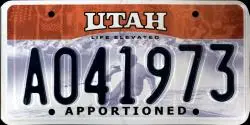Utah Apportioned Plates

If you operate commercial vehicles across state lines, understanding the International Registration Plan (IRP) is essential. Utah, as a member of the IRP program, requires eligible carriers to register for apportioned plates to remain compliant. These special plates allow interstate truckers, buses, and other qualifying vehicles to operate legally in multiple jurisdictions without needing separate registrations in every state.
Who Needs Utah IRP Registration?
Not every commercial vehicle in Utah needs apportioned plates. IRP registration applies only to carriers who meet specific criteria:
- Vehicles with a gross vehicle weight (GVW) over 26,000 pounds.
- Vehicles with three or more axles, regardless of weight.
- Fleets that travel across state or international borders for business purposes.
For example, a trucking company hauling freight between Utah and Colorado must register under IRP. Similarly, an owner-operator transporting loads into neighboring states is required to obtain apportioned plates. On the other hand, carriers that operate only within Utah do not need IRP registration and can rely on standard commercial plates.
Documents Required

To complete the Utah IRP registration process, carriers must provide:
- Proof of vehicle ownership (title or lease agreement).
- Proof of insurance meeting Utah’s minimum coverage requirements.
- Vehicle Identification Number (VIN) verification.
- Mileage records from the previous reporting period.
- Federal Employer Identification Number (FEIN) or Social Security Number (SSN) for sole proprietors.
Submitting accurate and complete documents is critical. Inaccuracies or missing paperwork can delay approval, leading to downtime and compliance issues.
Steps to Register for Utah IRP
The Utah IRP registration process can feel complex, but it follows a clear sequence:
- Gather Required Documents - Ensure all ownership, insurance, and mileage records are up to date.
- Complete the IRP Application - This form is available through the Utah Division of Motor Vehicles (DMV).
- Submit Fees - IRP fees are calculated based on your vehicle’s weight, total mileage, and the percentage of miles driven in each jurisdiction. For example, if most of your mileage is in Utah but a portion is in Nevada, your fees will be apportioned accordingly.
- Receive Apportioned Plates - Once approved, Utah DMV will issue apportioned plates and cab cards that allow your fleet to operate across participating jurisdictions.
Renewal of Utah IRP Registration
Utah apportioned plates must be renewed annually. Typically, carriers receive a renewal notice from the Utah DMV before expiration. The renewal process involves:
- Updating and submitting your mileage reports.
- Verifying insurance and ownership documents.
- Paying the calculated renewal fees.
It’s important to prepare early. Late renewals can result in penalties, delays, and even being placed out of service if caught operating with expired plates.
Get Your Utah IRP Registration with Us
Handling IRP registration on your own can be time-consuming and confusing. That’s where we come in. Our team specializes in Utah apportioned plate services, ensuring your application is accurate, complete, and processed quickly. With our help, you’ll:
- Save valuable time by letting experts handle the paperwork.
- Avoid costly mistakes that could delay your registration.
- Stay compliant and focus on running your business worry-free.
Don’t risk fines or downtime - let us simplify your Utah IRP registration today. Call (888) 202-4927 or click here to get started with a free quote.
